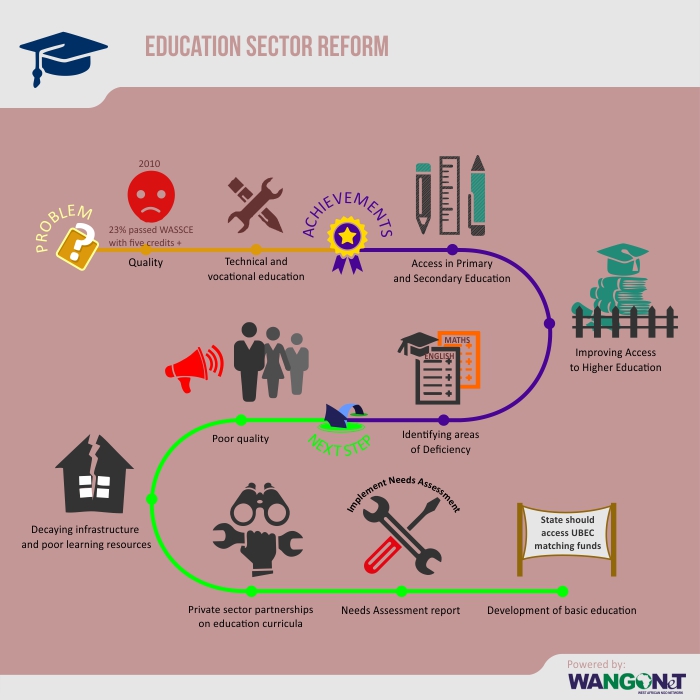Chapter 31
Education Sector Reform
Background
Educational infrastructure and learning resources had sufficiently deteriorated by 1999 that being well educated was reserved to only few autodidacts whom could educate themselves. Spaces in tertiary institutions could only accommodate about 21% of applicants. In 2010 only 23% of candidates passed the West African Senior School Certificate Examinations (WASSCE) with five credits and above, while just 9% so passed the National Examination Council (NECO).
Past Reform and Achievements
The Universal Basic Education (UBE) programme, a strategy for achieving education for all, was launched in 1999. Its bill, the UBE Bill, was later passed into law in 2004. Other programmes that have been passed to reform the education sector have included The Roadmap for the Nigerian Education Sector, and the One-Year Strategy for the Development of the Education Sector. The latest, a Four-Year Strategic Plan, was developed to provide a coordinated approach to addressing the challenges of quality education delivery in Nigeria; while targeting getting 10.6 million out-of-school children back into schools, and improving the quality and access to education at all levels.
Teacher training was additionally reviewed. Schools were constructed for Almajiri children. Technical and vocational education and training were reinvigorated. A Whole School Evaluation Policy (WSE) was also adopted in school evaluation. Twelve new universities were also established.
Primary school enrolment increased by 20.4%, between 2010 and 2012. In the latter year, the enrolment was 91% across the country. Enrolment into junior secondary school also increased by 23.9% from 2010 to 2012. The percentage of candidates passing with five credits and above in WAEC increased from 23% in 2010 to 39% in 2012; in NECO, from 9.36% in 2010 to 31.58% in 2012. About 91% of junior secondary school teachers and 73% of primary school teachers were aided in obtaining their respective professional qualifications.
Challenges and Next Steps
Partnerships should be developed with firms in various sector of the economy, to make the curricula being taught relevant to the nation’s economic development needs. Collaborative mechanism should be developed for overcoming the resistance of some parents to educating their own children. The massive infrastructural rehabilitation of both federal and state educational institutions should be continued. The remuneration of education workers should be improved so that needed talents could be attracted into the sector.


